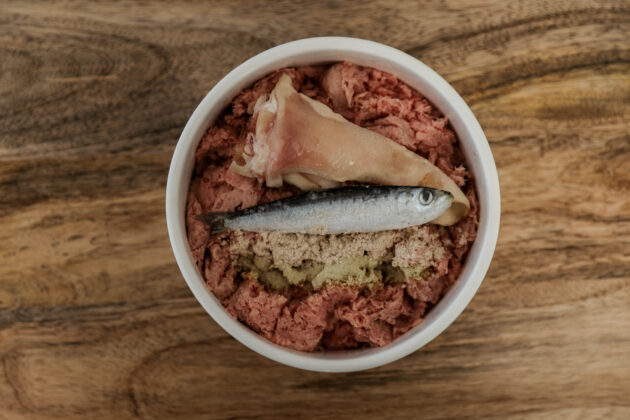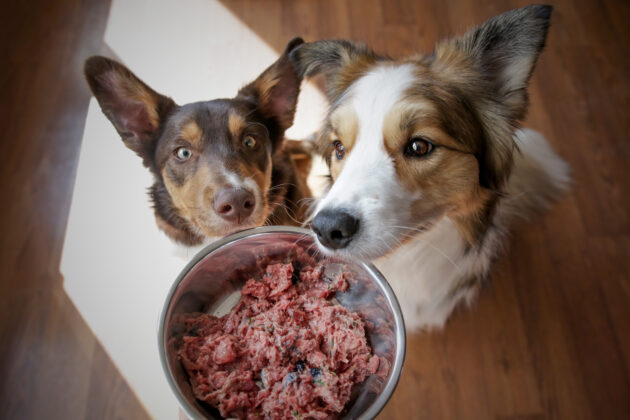
Pet parents go beyond kibble for furry pals
By Mark Juhasz
Food Trends Pet Food Big Country Raw Carna4 Editor pick SnufA deep dive into the innovations reshaping the pet food industry
 Carna4 produces synthetic-free, whole food nugget for dogs. Photo © Carna4
Carna4 produces synthetic-free, whole food nugget for dogs. Photo © Carna4 The COVID-19 pandemic marked a deepening acceleration of an existing trend in human-pet interaction and dynamics. As more people moved toward working from home and hybrid work arrangements, the companionship of pets became further entrenched. Demographically, many are having fewer children in urban environments. Pets also offer a well-known social and psychological benefit. Now, with the worst of the pandemic hopefully behind us, pet parenting is further established. Over half of Canadians own either a dog or cat and spend billions on their pets. The relationship between owners and their pets has also changed significantly, to what could be called ‘humanization’, ‘personalization’ and ‘premiumization’, and this is especially evident in the innovation underway in formulating pet foods and the ingredients going into these new products.
With approximately one billion domestic pets globally, how these animals are nourished is increasingly of concern to those who see their companions as a member of the family. Further, pets and humans share a supply of farmed animal proteins, and significant numbers of farmed animal products not eaten by humans go into pet foods. While there is growing diversity in human plant-based food offerings, there is a concurrent trend in pet foods to find healthier and more sustainable ways to feed our furry friends. For example, as recently as 2016, in the E.U., insect-derived proteins were allowed to be used in companion animal feed and insect-based pet foods.

Big Country Raw uses a combination of meats from turkey, lamb, and beef to salmon in pet food products. Photo © Big Country Raw
Innovation in pet food
Meanwhile, in Canada, companies like Snuf are producing a range of pet foods containing insect protein (specifically, black soldier fly protein, which is claimed to be hypoallergenic), chamomile and ashwagandha. Snuf labels their product as containing ancient grains, hypoallergenic, all natural, and planet friendly. Another example would be California-based Noochies, which uses nutritional yeast as the primary ingredient in its line of freeze-dried pet foods. Nutritional yeast is an all-natural product made by the process of culturing, which creates plentiful, bioavailable protein and B vitamins. Arguably, foods being provided to companion animals are becoming increasingly like what humans eat.
Further to the customization and premium orientation of new pet foods, owners are also looking for functional ingredients that can address or highlight functions for the unique age, breed, size, and specific health condition of their dog or cat, such as joint health, digestive health, or weight management. Healthy ingredients might include probiotics, prebiotics, and superfoods with micronutrients. High-quality protein sources, such as lean meats and fish, are featuring more prominently in pet food formulations, including the content and sourcing of the protein. Pet owners are seeking grain-free and limited ingredient lists for pets with food sensitivities and allergies, a trend in response to canine dilated cardiomyopathy.

Big Country Raw’s Thrive brand products have micronutrients like omega-3 fatty acids, essential vitamins, minerals, digestive enzymes, and prebiotic fibre agents for a healthy digestive tract in dogs and cats. Photo © Big Country Raw
Fresh, refrigerated, frozen and raw pet foods continue to gain recognition as pet parents look for alternatives to dry and canned foods. Smithville, Ont.-based Big Country Raw provides a range of raw pet foods for dogs and cats, and uses a combination of meats from turkey, lamb, and beef to salmon. Big Country Raw also produces Thrive, a pet probiotics brand. Combined, the raw food and probiotics provide the nutrients and micronutrients for pets including omega-3 fatty acids, essential vitamins, minerals, digestive enzymes, and prebiotic fibre agents for a healthy digestive tract in dogs and cats. Toronto-based Carna4 offers a synthetic-free, whole food nugget for dogs that is quick baked and air dried, as a ‘convenient alternative’ to raw pet food. The company also places emphasis on clean labels and minimal processing.
Additional ingredients finding their way into pet food formulations include turmeric, CBD, and adaptogens, all believed to provide anti-inflammatory, calming and overall well-being to pets.
Some owners are turning to homemade and DIY pet food, under the support of veterinarians and pet nutritionist, to have more control over ingredients and quality. For example, with lack of exercise, pet obesity is a growing concern, so pet foods targeting increasing demand for weight management diets and portion control recommendations can help maintain healthy weight in pets.
A growing demand for transparency in the pet food supply chains leads pet parents to want to know where ingredients come from and how the food was produced, and companies are now providing this information. Tails.com offers personalized pet menus as well as applications where pet parents can customize their pet’s diet based on its age, breed, health condition, and individual needs and preferences, refined with online questionnaires, and consultations with veterinarians, pet nutritionists, and even endorsed by organizing bodies such as the World Small Animal Veterinary Association (WSAVA).
Whether it is legacy companies such as General Mills, Purina, Royal Canin, and Tyson, or newer firms such as Natural Pet Food, Big Country Raw, The Chompery (producing pet snacks from all-natural ingredients, sourced and made in North America), Champion Pet foods (Orijen and Acana), who are renowned for high-quality, biologically appropriate pet foods using fresh, regional ingredients, or Open Farm, who are recognized for ethically sourced, sustainable pet foods with humanely raised meats and ocean-caught fish, the landscape of pet foods has permanently shifted to one of customized, personalized and conscious pet food purchasing. Canada is particularly well positioned to remain a leader in companion animal nutrition innovation with leading research centres such as the University of Guelph, and investment companies like Dane Creek Capital, who specialize in supporting companies that are the future of pet food.
Mark Juhasz, CEO of Harvest Insights, has over 20 years of experience in the agri-food sector. He can be reached at www.harvestinsights.com.
This article was originally published in the November/December 2023 issue of Food in Canada.
Print this page